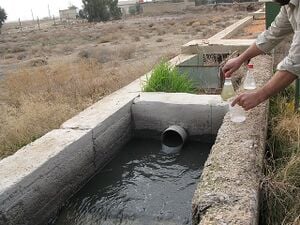
Substitute for pit latrines, septic systems or conventional sewage handling with:
- area-appropriate composting toilet design
Financial model:
Possibly as cheap as $20 per household in warm areas, assuming shared toilet banks. Practical, realistic designs have not undergone the "value engineering" necessary for this application yet, so are still too costly, although clearly a cheap, basic, functional unit for any given climate could be created.
Water System
Priorities[edit | edit source]
- public health is the overwhelming priority.
- low cost is essential - if it's not cheap, it won't be used as much and won't achieve as much.
- low ecological impact is very desirable if it doesn't compromise public health.
- suitable for various cultural practices. Target users may be accustomed to using water to cleanse (but can most often cope with small amounts of water), or other anal hygiene methods, so the device should ideally tolerate sticks, rocks, paper, or whatever else is likely to be thrown in.
Options[edit | edit source]
- Ventilated Improved Pit Latrine (Practical Action Technical Brief) A simple design for a toilet that can be dug anywhere. Fill the pit with refuse and plant a tree when you are finished!
- Composting toilet
- Biogas toilet, too large scale for the specs; for longer term settlement (due to capital cost, time for construction); relatively unproven. (E.g. Bio Latrines in Kenyan Slums.)
- Non-composting, non-biogas toilets
- Emphasis on public health (rather than sustainability or treating the waste as a resource).
- e.g. the BiPuW
- Cost? Chriswaterguy to find out.
- What's the status of the solid material afterwards? Can be composted?
- Proven in the field, including Aceh.[verification needed]
- Ultra-cheap systems, based on the Kamal Kar's work. Any applicable to this situation? Chriswaterguy to find out.
- What about small community based Constructed wetlands?
- Sawdust bucket toilet, after Joseph Jenkins' "Humanure Handbook" (fundamental reference on this topic, free to download) -- hygienic, private, cheap, hard to screw up, makes great compost... why aren't you using one?